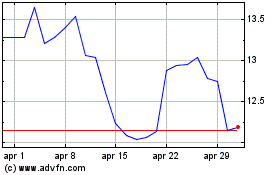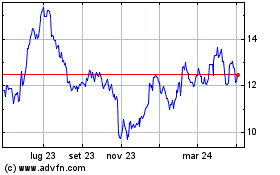Revamp includes job cuts, plant closures; several low-profit
models will be scrapped
By William Boston
This article is being republished as part of our daily
reproduction of WSJ.com articles that also appeared in the U.S.
print edition of The Wall Street Journal (January 11, 2019).
BERLIN -- Ford Motor Co. is launching an overhaul of its
money-losing European business that is expected to include
thousands of job cuts, plant closures and the cancellation of
low-profit models amid a series of bad news for global car
makers.
The move is part of a broad cost-cutting effort that Ford Chief
Executive Jim Hackett has embarked on in an industry facing the
challenges of electric vehicles and a push toward autonomous
driving.
In October, Ford informed employees of a global reorganization
that could affect salaried jobs, part of Mr. Hackett's push to
improve profits and boost its sagging stock price.
Steven Armstrong, the company's president of Europe, Middle East
and Africa, declined to provide details on the planned job cuts
during a call with reporters Thursday. He said they would be made
across the board throughout Europe and were still being negotiated
with trade unions, as local labor laws often mandate.
However, he said the belt-tightening would "have a substantial
impact," with details expected to be available by the end of June.
"It will be a significant number within the 50,000 we employ," he
added.
The restructuring is the latest sign that waning demand and
weaker profits in Europe -- amid concerns around Brexit, trade
tensions, the gradual death of diesel engines and an economic
slowdown in China -- are forcing car manufacturers to aggressively
prune their businesses after years of steady growth.
From January to November, the most recent data available, Ford
sold 910,391 vehicles in the European Union, down 2.3% from the
same period of 2017. That left the company with a 6.4% share of the
European market.
In November, new-car sales in the EU fell 8% from a year
earlier, following a 7.3% decline in October and a 23.5% plunge in
September. During the first 11 months of 2018, 14.2 million new
cars were sold in the EU, an increase of 0.8%.
In a separate announcement Thursday, Jaguar Land Rover, the
British premium car maker owned by India's Tata Motors Inc., said
it would cut 4,500 jobs world-wide. JLR has been struggling with
weaker demand in China and a dramatic decline in diesel vehicle
sales in Europe.
Ford rival General Motors Co. said in 2018 that it would close
five plants in the U.S. and Canada, after selling its European
business in 2017 to France's Peugeot SA, to boost profitability and
focus investment on new technology.
Unlike GM, Ford said it would stick it out in Europe, at least
for now.
"We decided the best option is to stay in Europe as long as we
can reset the business and make it profitable," Ford's Mr.
Armstrong said.
Ford, he said, has had trouble making money in Europe for
decades. But a convergence of global trends -- including pressure
to invest in new technology and consumer preferences shifting away
from traditional sedans to sport-utility vehicles and light trucks
-- coupled with a mandate from Ford headquarters to increase
profits were driving the restructuring decision.
The move in Europe is among the first elements of a broad,
multiyear revamping of Ford's global operations. Last summer, the
Dearborn, Mich., company said it would take up to five years to
execute an $11 billion restructuring, but has offered few details
about what parts of the business might be scrapped or sold, leading
to some frustration among analysts and investors.
In October, Mr. Hackett, the CEO, cited an "unexpected
deterioration" in Europe as a key reason why Ford cut its goal of
achieving an 8% global operating-profit margin by 2020. Ford's
losses in Europe widened to $245 million in the third quarter.
The new plan aims to boost its operating-profit margin in Europe
to about 6% in the midterm, still shy of Mr. Hackett's global
target.
To get there, Ford plans to stop making models that aren't
profitable. The first to go are the company's C-Max compact car and
Grand C-Max family sedan. As a result, Ford will curtail a shift at
its factory in Saarlouis, Germany, eliminating 1,600 jobs. The
company has already stopped making those models in the U.S.
"The industry has spent years chasing unprofitable business,"
Mr. Armstrong said. "Portions of our business are profitable. We
need to address the portion of our business which isn't
profitable."
Ford will also shut down production at its Ford Aquitaine plant
in Bordeaux, France, where it makes transmissions, clutches and
other components.
In the U.K., where Ford's operations are suffering from the
political uncertainty surrounding Britain's planned exit from the
EU, Ford is merging some administrative offices and functions. For
now, Mr. Armstrong said, no decision has been made on whether to
close its engine and components plants in Dagenham and Bridgend.
But, he said: "Nothing is off the table."
Mr. Armstrong said Ford still believes the U.K. will negotiate a
smooth transition out of the EU, but added that the restructuring
would likely be more severe if there is there is no agreement on
the departure.
Corrections & Amplifications The most recent data on
European new-car sales are for November. An earlier version of this
article incorrectly said October figures were the latest available.
(Jan. 10, 2019).
Write to William Boston at william.boston@wsj.com
(END) Dow Jones Newswires
January 11, 2019 02:47 ET (07:47 GMT)
Copyright (c) 2019 Dow Jones & Company, Inc.
Grafico Azioni Ford Motor (NYSE:F)
Storico
Da Mar 2024 a Apr 2024

Grafico Azioni Ford Motor (NYSE:F)
Storico
Da Apr 2023 a Apr 2024
